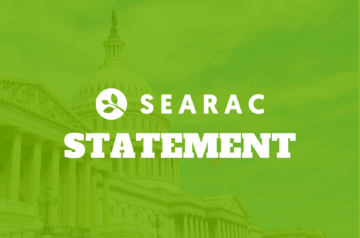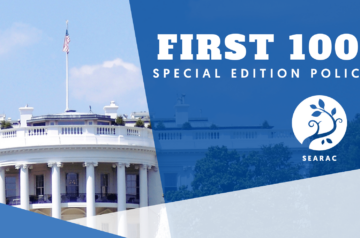By AAPI Data, NCAPA, EPIC, SEARAC and AAJC
Our organizations are calling on fellow community organizations, policy leaders, and researchers to join our effort to demonstrate the critical need for data disaggregation in our communities. We will share important context and detail about our call for action below. But, more simply, our fundamental appeal evokes a simple adage: “It’s the squeaky wheel that gets the grease.”
When it comes to federal agencies prioritizing data disaggregation for our communities, it is time to get more vocal and “squeaky.” Through our various conversations with federal agencies, it has become clear to us that these agencies will prioritize our communities’ needs more if we can effectively demonstrate that specific data, broken down by ethnicity, serves an important policy need.
So we need your help in delivering as many compelling “Data Use Cases” as possible to the federal government:
Please read below for more context, and fill out our form at aapidata.com/usecases by the priority deadline of Friday, August 16, 2024.
Background
After nearly 30 years, the Office of Management and Budget announced significant changes to its standards on how the federal government should collect race and ethnicity data, entitled Statistical Policy Directive 15, or SPD 15. Prior to this announcement, made in March of this year, many communities were rendered invisible as limited data was being collected on specific Asian American, and Native Hawaiian and Pacific Islander (AA and NHPI) subgroups.
This limited — and in some instances lack of — data, was due to the prior federal baseline requirement of collecting data on Asians and separately NHPIs. In practice, this meant a lack of data on COVID incidence and mortality rates among Filipinos and other Asian and NHPI subgroups; or data gaps on housing voucher utilization among Chinese Americans; or lack of data on liver cancer rates for Indian Americans, as examples.
A lack of data translates into a lack of resources. That’s why proper and adequate data collection can be a matter of life or death. We must ensure that each and every American is recognized, respected, and prioritized in data collection processes. For AA and NHPI communities, this means that moving forward, detailed reporting categories – such as Vietnamese, Tongan, and Filipino – will be the default expectation for all federal data agency collections. With detailed disaggregated data, policymakers will be able to recognize and prioritize the needs of AA and NHPI communities. Better data means better policies and lifesaving investments.
The revision of SPD 15 is a historical milestone, and the work is not done. It will take time and effort to implement these hard-fought measures and to navigate concerns the AA and NHPI community has on the timely and successful implementation of SPD 15.
After the publication of SPD 15, NCAPA, AAPI Data, EPIC ,and SEARAC met with the Chief Statistician of the United States and Deputy Director of OMB on May 1 at the White House. In that meeting, the Chief Statistician requested “Data Use Cases” to prioritize attention on the data disaggregation pillar of SPD 15 for federal agencies. Their reasoning was that it would showcase the utility of existing disaggregated data in AA and NHPI communities.
What is a Data Use Case?
Have you used data to either understand or make the case that AA and/or NHPI communities need more resources or additional support? Have you looked for critical data on AA and NHPI communities, and found that it didn’t even exist? Then you have a Data Use Case to share!
A Data Use Case is an example of how data is used to solve problems or develop solutions in support of the public interest. Data Use Cases could include: sharpening organizational programs to better serve target populations; obtaining grant funding or investment from philanthropy or government; shaping outreach to AA and/or NHPI communities; analyzing diversity, equity, and inclusion programs at businesses; or advocating for policy changes on a specific issue. These are just a few examples of how data are being used by nonprofits, government agencies, businesses, academia, and philanthropy for the betterment of AA and NHPI community members.
We are also collecting information to try to better understand what data your organization needs, but currently does not have, to better serve AA and NHPI communities — in particular, for specific ethnic groups.
What Kind of Organization Are You and What Are Examples of Use Cases?
- AANHPI-serving nonprofit: How has the use of disaggregated data specifically helped in delivering programs to your community, assisted in advancing advocacy/policy goals, strengthening investment in your organization/community, or shaped outreach?
- Academia: What are specific findings stemming from disaggregated data, proposals to address these findings, and interventions developed to address these inequities?
- Philanthropy: Have you invested in specific AA and NHPI communities before, and to what end? Have you supported research that supports the understanding of inequities and funds efforts to address disparities?
- Business: Have you used data to address diversity, equity, and inclusion issues?
Why Do We Need Data Use Cases Now?
Collecting AA and NHPI Data Use Cases is time-sensitive work given federal agencies are tasked with developing SPD 15 “action plans” by September 2025. Ensuring community feedback early to OMB through submission of these Use Cases and involvement with these action plans will be essential.
We Need Your Help: Submit A Data Use Case
The Data Equity Working Group of the National Council on Asian Pacific Americans (NCAPA) is initiating an open call for Data Use Cases to support the U.S. Chief Statistician and the federal government’s implementation of SPD 15.
Submit your Data Use Cases by filling out this form with as much detail as possible. The priority deadline to submit a Data Use Case will be EOD Friday, August 16, 2024.
Concrete examples and greater specificity of the impact of disaggregated data will give your response more weight. We are also interested in what kinds of specific data you need to better serve the AANHPI population.
Thank you for your interest and participation. We believe the community voice is critical to the full implementation of SPD 15. Join us in ensuring that AA and NHPI communities are recognized and prioritized!
Note: Every Data Use Case submission is greatly appreciated and valued. We will review each submission and follow up if any additional information is required — select submissions will be presented to the U.S. Chief Statistician.



